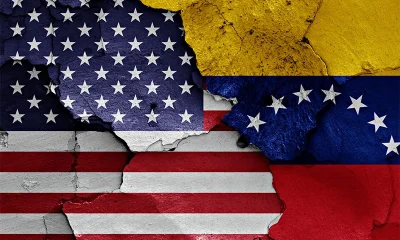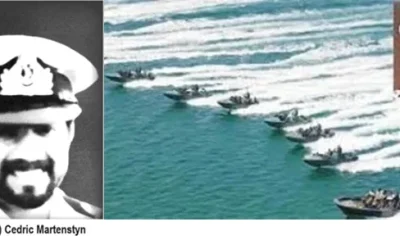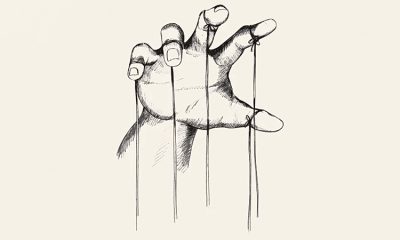Editorial
Moment of truth for NATO

Saturday 26th February, 2022
Russian missiles were pounding strategic targets in Kyiv at the time of writing. Russia seems hell bent on achieving its goal—disarming the Ukrainian military and installing a puppet regime in Kyiv to obviate possible security threats to Moscow. One’s heart naturally goes out to the hapless Ukrainian public caught in a war, which has resulted from a big power rivalry. NATO sought to expand itself right up to the Russian border via Ukraine, prompting Moscow to react militarily. The manner in which Russia has sought to counter the NATO move or threat cannot be countenanced, but Ukraine should have known better than to be a pawn in the games the western countries play to further their interests.
Terrified Ukrainian men, women and children are cowering in makeshift bomb shelters, and some of them are perishing in attacks. The blame for the Ukrainian war should be apportioned to the US as well; it is Washington’s push for the enlargement of NATO into Ukraine that enraged Moscow beyond measure. The US and its lackeys such as the UK and the EU ought to do unto others what they would have others do unto them. They will go to any extent to neutralise threats, both real and perceived, to their national security, but do not want others to do so!
Everybody condemns invasions but nobody comes forward to stop them when big powers happen to be the aggressors. The so-called world order is no different from what is seen in cowboy flicks; firepower takes precedence over justice and fair play. Wars are governed by Rafferty’s rules when they are waged by powerful nations. Might is right whether one likes it or not.
The biggest threat to global peace comes from the duplicity of the big powers and the UN. The EU has imposed sanctions on Russia purportedly for the sake of the Ukrainian public. If only it had shown the same concern for the people of Iraq and Afghanistan during the US-led invasions. It became known to the whole world that the UK and the US had falsified intelligence dossiers to bolster their bogus claim that Saddam Hussein had weapons of mass destruction and therefore Iraq had to be invaded to neutralise the threat. More than half a million children died in the Iraq war alone. The US and its allies killed a large number of Afghan civilians as well. But neither the EU nor Canada nor any other powerful nation told the US and the UK to stop the invasion, much less imposed sanctions. The countries that rightly opposed those illegal wars are now endorsing Russia’s military aggression against Ukraine! The UN makes all the noises in the world, like a mouse caught in a trap, but is too impotent to take action against big powers; it is taking on only weak nations.
Ukrainian President Volodymyr Zelenskyy has been entreating the world to step in to stop Russia, but it is highly doubtful whether he will receive any direct military help. Despite Washington’s rhetoric and braggadocio, there is a limit beyond which the US cannot help Ukraine militarily, given its ignominious withdrawals from Vietnam and Afghanistan. The Ukrainian armed forces are no match for the Russian military Leviathan, and US arms and training will be of little use to them.
As for the economic sanctions imposed by the US , the UK, the EU, etc., Russia is a key player in the global oil, gas and grain markets; Ukraine is also a major grain producer, and its food exports are likely to be under Russian control soon. The prices of oil, gas and grain have soared globally since the invasion of Ukraine began, and the war will have a devastating effect on the global economy. That is why the US and the EU have stopped short of burning bridges; they have decided against cutting Russia off from the SWIFT global interbank payments system mostly used by countries to pay for gas and oil. The western bloc cannot afford to go all out to tame Russia. And Putin knows it.
Zelenskyy has already criticised the West for not coming to his country’s aid. This is the fate that awaits weak nations that make the mistake of taking sides in conflicts between world powers. Russia is wrong and has to stop wreaking destruction on its neighbour, but who is equal to the task of making it do so? This is the moment of truth for NATO, which lured Ukraine into being a party to its grand plan to encircle Russia.
Editorial
Reining in executive juggernaut

Monday 26th January, 2026
Prime Minister Dr. Harini Amarasuriya and Opposition Leader Sajith Premadasa have agreed on the appointment of three civil society (CS) representatives to the Constitutional Council (CC) to succeed Dr. Anula Wijesundere, Dr. Prathap Ramanujam and Prof. Dinesha Samararatne. The new members are Austin Fernando, Prof. Wasantha Seneviratne and Ranjith Ariyaratne, according to media reports.
The new CC appointments have come at a very crucial time. The National Audit Office (NAO) remains headless because the NPP government’s efforts to appoint one of its cronies as the Auditor General (AG) have met with stiff resistance. The CC, by majority decision, rejected three nominations made by President Anura Kumara Dissanayake, who had overlooked the Acting AG, the most eligible candidate in the NAO. Dr. Wijesundere, Dr. Ramanujam and Prof. Samararatne acted as an effective counterweight to the government members of the CC. President Dissanayake kept the NAO without a head. The Opposition claimed that the government was waiting until the departure of the three CS members to manipulate the CC and appoint a person of its choice as the AG.
The three outgoing CS members were instrumental in changing the public perception that the CC was a mere rubber stamp for the Executive. There has been a controversy over the appointment of the head of the Commission to Investigate Allegations of Bribery or Corruption, with the Opposition insisting that the government succeeded in misleading the CC into overlooking the most eligible candidate. However, overall, the three CS representatives carried out their duties and functions commendably well.
The outgoing CS members have set a very high bar. One can only hope that their departure will not help President Dissanayake render the CC malleable, and their successors, together with the Opposition members of the CC will continue to thwart the Executive’s efforts to undermine the independence and integrity of the NAO.
The CC has reportedly declined a Right to Information request for naming its members who voted for and against a person nominated by President Dissanayake for the post of AG. The public has a right to know how the CC members vote in respect of vital appointments. Nevertheless, information about voting at CC meetings cannot be kept secret; it is leaked to the media.
A protracted delay in appointing the AG or the elevation of a crony of the government to that post will increase the risk of mismanagement of state funds, erode public trust and confidence in the NAO, undermine legislative oversight and impair fiscal discipline. Most of all, the government’s failure to appoint a competent, independent person of integrity as AG will diminish donor confidence, especially at a time when the country is seeking funds from the international community for disaster relief and rebuilding. There is no way the government can justify its refusal to appoint the Acting Auditor General as the head of the supreme audit institution. There are other deserving officials in the NAO, and they must not be overlooked.
The Bar Association of Sri Lanka has called upon President Dissanayake to appoint a person with proven competence, integrity, and independence, who commands wide acceptance as the Auditor General forthwith. It has stressed the need to appoint a nonpartisan professional to that post to safeguard the integrity of the NAO and inspire the confidence of both citizens and international partners in the financial governance of the State. Transparency International Sri Lanka, the Civil Society Organisations and the other good governance activists, too, have faulted President Dissanayake and his government for the inordinate delay in appointing AG.
Sri Lanka’s experience with all supermajority governments has been a very bitter one. Hence the need for effective countervailing forces to keep them in check. It is hoped that the CC, with the help of its newly appointed CS representatives, will retain its integrity and independence and live up to people’s expectations by reining in the executive juggernaut careening downhill and bearing down on all democratic institutions.
Editorial
Poor schools on chopping block

The Opposition asked the government, in Parliament on Friday, whether the latter would go ahead with its plan to close down low-attendance schools, and if so, what would happen to the students in them. The government said the number of students would not be the sole criterion for what it described as ‘school restructuring’, and factors such as population density and transport would also be taken into consideration. Its response smacked of obfuscation.
President Anura Kumara Dissanayake, speaking in Parliament, in July 2025, said 98 state-run schools were without new admissions. Pointing out that about 15% schools had fewer than 50 students each, and about two-thirds of schools had fewer than 100 students each, the President said a strategy to overcome the problem might necessitate the permanent closure of some of those seats of learning. According to teachers’ trade unions and organisations dedicated to protecting universal free education, most of these low-enrolment schools are situated in rural areas. The predicament of these schools is usually attributed to several factors such as the development of public transport, which has enhanced students’ mobility and lessened their dependence on rural schools which are in a state of neglect.
The Ceylon Teachers Union (CTU) has accused the government of trying to close down low-enrolment schools across the country, and redeploy teachers currently working in them to fill vacancies elsewhere. There are 10,146 state-run schools in Sri Lanka. Of them 9,750 are under Provincial Councils and 396 are national schools. About 800 rural schools have already been closed down during the past several decades, and it is feared that many more will face the same fate in the near future.
One of the pithy slogans the JVP coined during its second armed uprising in the late 1980s was ‘Kolombata kiri, gamata kekiri’ (‘milk for Colombo and melon for the village’), which highlighted the glaring urban bias in the allocation of state resources for development. Those who voted the JVP-led NPP into power, expected underprivileged schools to be developed as a national priority. But all signs are that they will be left with neither ‘milk’ nor ‘melon’.
Previous governments, which the JVP/NPP has condemned as a curse, bore the cost of operating low-enrolment schools. True, they also closed down some low-attendance schools but did not plunge head first into doing so. What one gathers from the statements made by the JVP/NPP heavyweights, including President Dissanayake, is that the government is planning to go full throttle on the school closure project.
Closing down low-attendance schools may make economic sense for the NPP and the Bretton Woods Twins, but that is bound to lead to serious social issues. The government has offered to provide the students in schools earmarked for closure with transport to other schools. This offer is based on the assumption that transport is the sole factor that has prevented them from attending urban schools. There are other reasons why they have had to stay in the underprivileged schools.
Prudence demands that the JVP-led NPP government refrain from rushing to close down the low-enrolment schools and explore ways and means of making them attractive to more students who cannot attend urban schools for reasons other than transport issues. Otherwise, there might be an increase in the school dropout rate in the rural sector. President Dissanayake, in his aforesaid speech, informed Parliament that the school dropout figures had risen from 16,673 in 2019 to 20,759 in 2022, before plateauing at 20,755 in 2024. Everything possible must be done to bring the dropout rate down in the shortest possible time. A steep school dropout rate is far more than a mere statistic; it is a symptom of systemic social issues.
The state has a strong justification for bearing the cost of operating low-attendance schools, for such expenditure helps reduce dropouts, promote educational equity, prevent social problems and build human capital. The government must handle this sensitive issue with great care and ensure that the poor students will have at least ‘melon’.
It is said that he who opens a school door, closes a prison. Ironically, questions happened to be raised in Parliament about the closure of underprivileged schools soon after the government’s declaration that it would spend Rs. 4.36 billion to construct a new prison in Kandy.
Editorial
When docs down stethoscopes

Saturday 24th Junuary, 2026
Doctors launched a 48-hour token strike yesterday in protest against what they have described as the government’s failure to implement a six-point agreement reached between the Government Medical Officers’ Association (GMOA) and the Ministry of Health. They are demanding that their allowances be increased and a separate service minute be introduced for the state sector doctors, among other things. The government has claimed that the doctors’ demands are unreasonable, and the strike did not cripple the state health institutions. It is sounding just like its predecessors.
The government is either misinformed or believing in its own propaganda lies. Doctors’ strikes always have a crippling impact on the state-run hospitals and cause unbearable suffering to patients who are dependent on free healthcare. The government should stop making false claims, and face reality.
Ideally, doctors should not strike at the expense of the sick, but there arise situations where they are compelled to flex their trade unions muscles to jolt governments into heeding their grievances. The incumbent government led by the JVP, which used strikes as part of its strategy to capture state power, has failed to be different from the previous administrations which mismanaged labour issues and provoked workers into trade union action, causing much inconvenience to the public. State workers and their trade unions backed the JVP-led NPP to the hilt, enabling its meteoric rise to power, and after winning the 2024 general election, the NPP declared that there would be no need for strikes thereafter because the new government would resolve all trade union disputes amicably without leaving any room for work stoppages. That pledge has gone unfulfilled.
Opinion may be divided on the striking doctors’ demands, but if the government has agreed to grant them, it must fulfil its pledge or have another round of negotiations and arrive at a compromise formula. It will be a mistake for the government to play a game of chicken with the GMOA or try to intimidate doctors with the help of its propaganda hitmen and front activists who stage protests against strikers, posing as patients and concerned citizens and calling for action to crush trade union struggles. Such tactics are counterproductive.
The warring doctors must also be flexible. Although the government, in its wisdom, has boasted that the state coffers are overflowing and it is free from pecuniary woes due to its proper economic management and its successful battle against corruption, the economic situation is not that rosy. Recent natural disasters have taken a heavy toll on the economy, and rebuilding and relief programmes will cost a great deal of state funds. So, the GMOA should factor in this harsh reality and act accordingly for the sake of the ordinary people who cannot afford to pay for healthcare. It is the interests of the public that must prevail.
The GMOA has threatened to stage a continuous strike unless the government grants its demands without delay. If the history of health sector strikes is anything to go by, the doctors are very likely to carry out their threat. The government should stop letting the grass grow under its feet and bring the GMOA to the negotiating table, and have a serious discussion. An assurance from President Anura Kumara Dissanayake himself that the government’s promises to the doctors will not go unfulfilled may help defuse tension and prevent a crippling health sector strike. A confrontational approach is bound to aggravate the situation.
-

 Business19 hours ago
Business19 hours agoComBank, UnionPay launch SplendorPlus Card for travelers to China
-

 Business2 days ago
Business2 days agoComBank advances ForwardTogether agenda with event on sustainable business transformation
-

 Opinion7 days ago
Opinion7 days agoAmerican rulers’ hatred for Venezuela and its leaders
-

 Opinion5 days ago
Opinion5 days agoRemembering Cedric, who helped neutralise LTTE terrorism
-

 Business5 days ago
Business5 days agoCORALL Conservation Trust Fund – a historic first for SL
-

 Opinion4 days ago
Opinion4 days agoA puppet show?
-

 Opinion2 days ago
Opinion2 days agoConference “Microfinance and Credit Regulatory Authority Bill: Neither Here, Nor There”
-

 Opinion7 days ago
Opinion7 days agoHistory of St. Sebastian’s National Shrine Kandana













